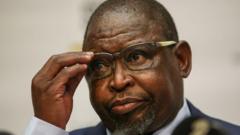The postponement of South Africa's national budget by Finance Minister Enoch Godongwana after coalition disputes over proposed tax increases highlights significant governance challenges in the wake of parliamentary shifts.
South Africa's Finance Minister Postpones Budget Amid Coalition Tensions

South Africa's Finance Minister Postpones Budget Amid Coalition Tensions
Enoch Godongwana's bid to announce the national budget stalls due to disagreements within the ruling coalition, shaking financial markets.
Enoch Godongwana, South Africa's Finance Minister, faced a major setback when he was compelled to delay the announcement of the national budget due to intense disagreements among coalition partners. The proposed increase in value-added tax (VAT) from 15% to 17% was met with fierce opposition, particularly from the Democratic Alliance (DA), which argued that such a hike would exacerbate financial struggles for South African citizens amidst a prevalent cost-of-living crisis.
The current coalition government, formed after the African National Congress (ANC) lost its parliamentary majority in last year’s elections, has been under strain. This postponement is unprecedented in South Africa since the end of white-minority rule in 1994, leading to an immediate negative reaction from the markets as the nation’s currency sharply declined against the US dollar.
DA leader John Stenhuisen expressed that the party could not support the VAT increase, which they believed would harm the economy further. Other coalition members, including the Freedom Front Plus, claimed they were only informed of the hike right before the budget was set to be unveiled. Reflecting on the chaos, Godongwana stated that the planned tax increase had been mentioned at a cabinet meeting the previous week.
The budget has now been tentatively rescheduled for March 12, allowing for discussions aimed at resolving existing differences within the coalition. The Economic Freedom Fighters (EFF), a prominent opposition party, criticized the delay as indicative of ineffective governance, while the DA viewed it as a victory and vowed to advocate for a more conducive budget for economic growth and job creation. As South Africa braces for further economic challenges, the focus will now shift to the discussions that precede the new budget announcement.
The current coalition government, formed after the African National Congress (ANC) lost its parliamentary majority in last year’s elections, has been under strain. This postponement is unprecedented in South Africa since the end of white-minority rule in 1994, leading to an immediate negative reaction from the markets as the nation’s currency sharply declined against the US dollar.
DA leader John Stenhuisen expressed that the party could not support the VAT increase, which they believed would harm the economy further. Other coalition members, including the Freedom Front Plus, claimed they were only informed of the hike right before the budget was set to be unveiled. Reflecting on the chaos, Godongwana stated that the planned tax increase had been mentioned at a cabinet meeting the previous week.
The budget has now been tentatively rescheduled for March 12, allowing for discussions aimed at resolving existing differences within the coalition. The Economic Freedom Fighters (EFF), a prominent opposition party, criticized the delay as indicative of ineffective governance, while the DA viewed it as a victory and vowed to advocate for a more conducive budget for economic growth and job creation. As South Africa braces for further economic challenges, the focus will now shift to the discussions that precede the new budget announcement.




















